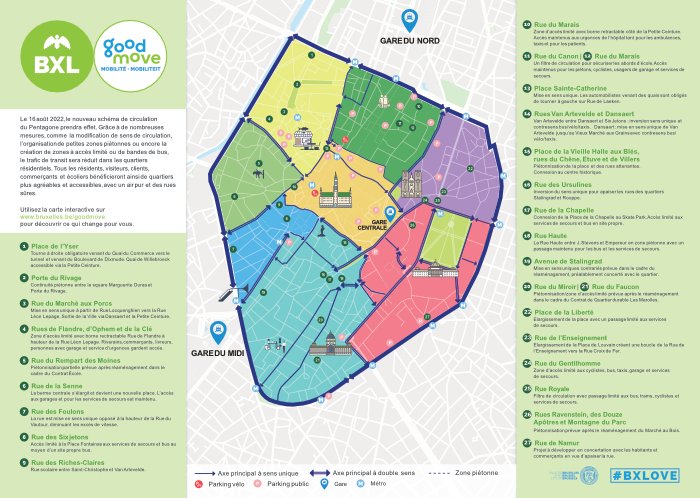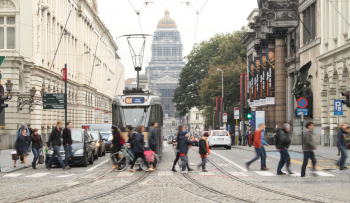
Good Move Brussels takes another step in the right direction
A new circulation plan in Brussels city centre aims to reduce traffic, creating more liveable neighbourhoods throughout the city. The plan is part of a growing political trend to move away from car-centric urban policy across Europe.
On 16 August 2022, a new circulation plan was implemented in the Brussels city centre as part of the Brussels Capital Region’s “Good Move” mobility plan. The new plan will restrict the movement of cars in several parts of the city centre, known as the Pentagon, with an overall aim to make local neighbourhoods more accessible, pleasant and safe for all modes of transport, including cycling.
According to Bart Dhondt, the city’s alderman for mobility, the plan will play an effective role in achieving the region’s ambition of reducing car traffic by 24% by 2030, with a key focus on preventing cars from outside Brussels from crossing the city centre. Instead, drivers who are passing through the centre will be directed to the city’s ring road, while new parking regulations will guide those wishing to visit the Pentagon to the nearest car park. These parking “destination loops” will help reduce the number of cars driving around the city in search of parking.
As well as this, major roads within the Pentagon will no longer be filled with traffic, with the circulation plan introducing 27 changes to areas across the city, including changes in the direction of traffic, the creation of small pedestrian or restricted access zones, and bus lanes.

Diagram of changes implemented across the city. Source: bruxelles.be
“If you look at the numbers, only 20 to 25 percent of the people who live or come to work here use cars,” said Dhondt in a recent interview with POLITICO. “Most of our traffic comes from people driving through to other places, so we're sending them out of the city centre.”
“The objective of all of this is to create more space for people to live, for kids to play, for residents to be able to walk and cycle safely,” he added.
Less cars, safer streets, more bikes…right?
Concern for safety is one of the largest deterrents in preventing people from getting on their bikes. According to a recent study published by the European Commission, cars are the most-involved vehicle when it comes to road fatalities in the EU. These findings also hold true for Brussels, which has seen a considerable drop off in injuries and fatalities over the last two years, as Good Move regulations have been steadily implemented throughout the region to make its public spaces less car-oriented, such as the implementation of 30 km/h zones.
Reducing the amount of cars is the most effective method of reducing injuries and fatalities on our roads, making streets safer and more attractive for cyclists. In fact, according to one particular study, by taking through traffic out of a neighbourhood, it is possible to reduce the number of injuries by 72% per 1,000 residents!
While it is still too early to determine whether the latest changes to the Pentagon’s mobility circulation will bring dramatic improvements to cycling conditions in the city centre, it is fair to say that acting on ambitions to reduce the amount of cars in the city is a step in the right direction, and a trend which is beginning to catch on elsewhere in the world.
Political courage needn’t be in short supply
So, how has the Belgian capital arrived at this moment of change? What has it taken to break with decades of perceived wisdom and business-as-usual car domination? Well, in the case of Brussels there has been a lengthy process of public consultations, surveys and coalition building undertaken by city officials. The Good Move plan has been led by the Greens in government that have progressively won elections on a mandate to improve life for residents and visitors to the city.
Change takes time, Good Move has been a long time in the making as all stakeholders were consulted when addressing concerns and designing a circulation plan that meets people’s needs. Image source: Twitter @BenoitHellings
In fact, there is now a long list of cities from across Europe that have taken bold steps to reduce traffic congestion in their city centres and reclaim streets for people rather than cars and parking. From cities the size of Leuven, Belgium or Pontevedra, Spain to the metropolises of Barcelona and Paris; we are seeing a shift in urban policy towards favouring equality of access and improved quality of life for all over private car usage. Though controversial, it is becomingly exceedingly clear that these policies, once introduced, are winning elections too.
Milan’s Mayor recently won re-election whilst promising to continue the cycling reforms that were initiated during the COVID-19 pandemic and Mayor Anne Hidalgo of Paris also returned for a second term with a clear margin of votes in her favour, despite vocal opposition from some quarters. Indeed, the pandemic showed citizens of cities everywhere that another way was possible and it gets to a point where “bikelash” controversy stirred up by vocal critics becomes tedious and obviously runs contrary to common sense.
Brussels now joins a growing list of cities whose administrations are responsibly confronting the many challenges facing our societies. Challenges such as increasing congestion, deteriorating air quality, CO2 emissions, scarce and inequitably shared public space and unequal access to mobility can all be addressed by reducing cars in favour of public transportation, walking and of course cycling. After another summer of record heat it is hard to argue that Good Move isn’t… well… a good move or at least a step in the right direction for the capital of Europe.
The Brussels Capital Region is a proud member of ECF’s Cities & Regions for Cycling, a network bringing together local and regional administrations, actively working to promote the bicycle as a mode of transport and leisure. Interested in your city or region joining? Find out more here.
Regions:
Network/Project Involved:
Contact the author
Recent news!
Upcoming events
Contact Us
Avenue des Arts, 7-8
Postal address: Rue de la Charité, 22
1210 Brussels, Belgium









